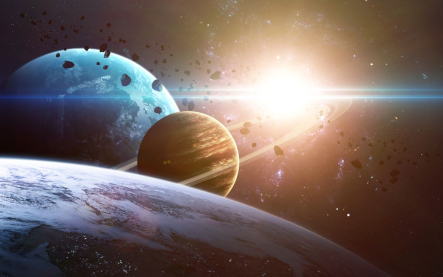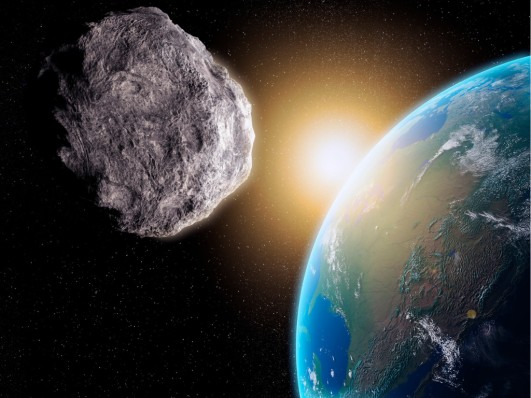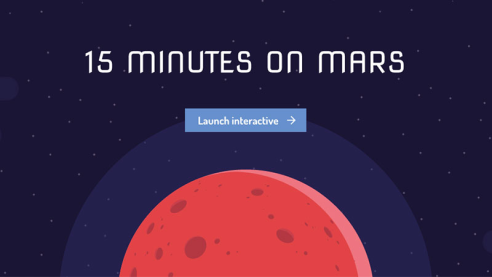This year's theme: Living in Space
-
Microgravity: living on the International Space Station
Learn more to access more details of Microgravity: living on the International Space StationThis free badged open course, Microgravity: living on the International Space Station, will help you to consider microgravity environments in more detail than before! You will make direct comparisons of some important physical values between the International Space Station (ISS), the Earth and the Moon.

-
Is there life on Europa?
Read now to access more details of Is there life on Europa?The potential for an ocean on Jupiter’s moon Europa opens up the possibilities of it being habitable for life. With missions due to visit the moon in the coming decade, it is an exciting time for astrobiologists. This article explores why Europa might be a target in the search for life, and what the potential might be of finding it there.

-
Living on the Moon
Watch now to access more details of Living on the MoonMembers of The Open University contribute to a video by the Royal Society, explaining how to survive on the Moon for more than a couple of days.

Guard the galaxies
-
Introduction to Planetary Protection
Learn more to access more details of Introduction to Planetary ProtectionAs we explore the Solar System, it is important that we do not accidentally contaminate untouched and unspoilt extraterrestrial environments in any way. In this free course you will learn about ‘Planetary Protection’ and why it is critical for our future exploration and use of space. This course has been developed with support from the ...

-
What is Planetary Protection?
Read now to access more details of What is Planetary Protection?As we explore the Solar System, it is important that we do not accidentally contaminate untouched and unspoilt extraterrestrial environments in any way. This is especially true when searching for evidence of life. This article explores the concept of ‘Planetary Protection’ and why it is critical for the future of space exploration.

-
Planetary Protection
Read now to access more details of Planetary ProtectionProtecting the space environment is becoming ever more critical so we’ve collated some FREE resources on protecting planetary bodies as humans explore extraterrestrial environments.

Launch one of our stellar space interactives and games
-
Space: to boldly, but cautiously, go.
Take part now to access more details of Space: to boldly, but cautiously, go.Space exploration is full of possibilities, especially when searching for signs of life. But the reality is complex. What lies behind the many decisions that have to be taken to design and run a space exploration mission?

-
Defending Earth from asteroids
Take part now to access more details of Defending Earth from asteroidsLearn how space agencies defend Earth from asteroid threats and how real-life planetary defence compares to sci-fi blockbusters like Deep Impact and Armageddon.

-
15 minutes on Mars
Take part now to access more details of 15 minutes on MarsHave you ever looked up into the night sky at the red planet and wanted to know more? Now here’s your chance to explore Mars.

Blast off to the icy worlds
-
Europa: a collection
Read now to access more details of Europa: a collectionJupiter’s moon Europa is the target of several exploration missions that will be sending data back to Earth over the coming years. Find out more about this moon and what these missions are investigating by reading our free articles, courses and other resources.

-
Moons of our Solar System
Learn more to access more details of Moons of our Solar SystemIn this free course, Moons of our Solar System, explore the many moons of our Solar System. Find out what makes them special. Should we send humans to our Moon again?

-
The ice-covered ocean worlds of the outer Solar System
Read now to access more details of The ice-covered ocean worlds of the outer Solar SystemWhat do we know about Jupiter's and Saturn's icy moons? Could there be life on them? This article explores what previous missions can tell us and what future missions hope to find out.

Out of this world content on meteorites and asteroids
-
The Magic of Meteorites
Read now to access more details of The Magic of MeteoritesIn March 2021, several rare meteorite fragments were found in Winchcombe, Gloucestershire. We celebrate this amazing discovery with a mini documentary and other FREE resources on meteorites…

-
60 Second Adventures in Astronomy: Gaia and the Killer Asteroids
Watch now to access more details of 60 Second Adventures in Astronomy: Gaia and the Killer AsteroidsHow does Gaia detect any dangerous Earth-crossing asteroids?

Take off with a 60 second adventure in astronomy
-
60 Second Adventures in Astronomy: The Big Bang
Watch now to access more details of 60 Second Adventures in Astronomy: The Big BangDiscover how scientists have calculated the exact volume of the noise created at the birth of the Universe with this video

-
60 Second Adventures In Astronomy: A day on Mercury
Watch now to access more details of 60 Second Adventures In Astronomy: A day on MercuryFind out how you'd pass the time on Mercury - where a single day lasts two years

-
60 Second Adventures in Astronomy: Black holes
Watch now to access more details of 60 Second Adventures in Astronomy: Black holesIs it possible to make your own black hole? DIY experts take note with this animation

Take one small step to our resources on the moon
-
Mythbusting moons
Watch now to access more details of Mythbusting moonsWould we have tides if we had no Moon? Is a ‘supermoon’ an important event? Can moons have moons? Enjoy this short animation.

-
Big moon rising
Read now to access more details of Big moon risingDavid Rothery doesn't think the supermoons we're due to see deserve that much attention. Here's why...

-
The Moon
Learn more to access more details of The MoonAs the only planetary body everyone is familiar with seeing in the sky, the Moon has long been an object of fascination and speculation. This free course will teach you about the nearest planetary body to Earth: the missions to the Moon, the basic facts of its composition, the cratering on its surface, and the ancient eruptions that flooded many...

... And one giant leap to our free courses
-
An introduction to exoplanets
Learn more to access more details of An introduction to exoplanetsThis free course, An introduction to exoplanets, introduces our galaxy's population of planets, and some of their many surprises. It explains the methods used by astronomers to study exoplanets, and provides a general introduction to the methods of scientific inquiry. The course culminates in discussion of life elsewhere in our Galaxy.

-
Astronomy with an online telescope
Learn more to access more details of Astronomy with an online telescopeThis free course shows you how to navigate the night sky, and introduces the wide variety of objects it contains. You will develop a hands-on understanding of telescopic observations using the Open University’s own robotic telescope facility COAST sited on the island of Tenerife. Supported by your own measurements we illustrate how stars...

-
Galaxies, stars and planets
Learn more to access more details of Galaxies, stars and planetsThis free course, Galaxies, stars and planets, is a general introduction, including scale of the universe from the very large to the very small; orbits and gravity; the Solar System; the Sun and other stars; galaxies and the composition of astronomical objects.



Rate and Review
Rate this article
Review this article
Log into OpenLearn to leave reviews and join in the conversation.
Article reviews